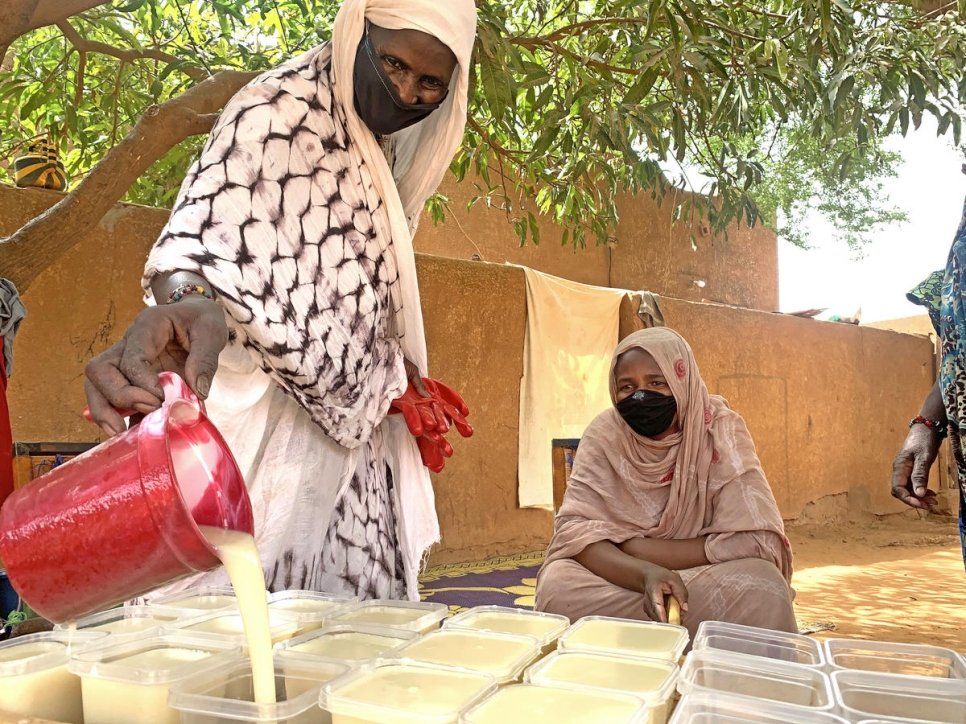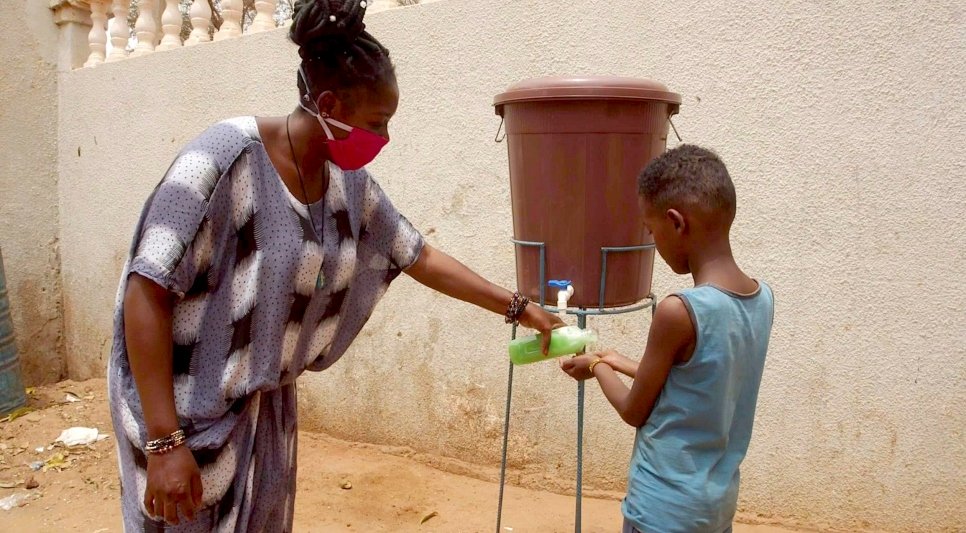Self-help project in Niger churns out hygiene products in fight against coronavirus
Mini refugee 'factory' produces soap, liquid handwash, bleach and water containers for free distribution.

A refugee woman pours soap into moulds at a soap factory in Hamdallaye, Niger. The soap is distributed for free to fellow refugees and the local community. © UNHCR/Jean-Sebastien Josset
It started as a mini-cooperative to give a small income for hundreds of refugees evacuated from Libya.
But with the onset of the coronavirus pandemic, this small self-help project has grown into a "factory" and churns out bars of soap, liquid handwash, bleach and water containers for free distribution.
The project was established in 2019 by UNHCR, the UN Refugee Agency and Forge Arts, a local non-profit, at an emergency transit mechanism (ETM) centre in Hamdallaye, a small town less than 100 kilometers from Niamey, Niger's capital.
"We are not only helping to fight this disease but are learning new skills.”
Here, over 280 refugee women work, doing their part to respond to the increasing demand for hygiene products.
"We are not only helping to fight this disease but are also learning new skills that will help us when we return home,” says Nicole, who was evacuated from Libya and currently lives in the centre, where she’s learnt how to make bleach without using any machinery.
Aboubacari Nana Kadidjatou, the administrator of Forge Arts, which conducts the training at the ETM, adds that equipping the women with these skills is essential.
“This COVID-19 crisis is a real tragedy," says Kadidjatou. “But thanks to the training, the refugees are now part of the response. This makes them feel useful.”

In Niger, a skills training programme for Malian refugees is now helping the fight against coronavirus (Jean-Sébastien Josset, cameraperson/ Linda Muriuki, producer/ Werema Joshua, editor)
Since the pandemic started, Niger has confirmed 860 cases of COVID-19. With some 215,000 refugees and a further 225,000 internally displaced people or IDPs in the country, the risk of the virus spreading to displaced populations where crucial health facilities are overstretched is high.
UNHCR has been implementing special prevention measures that include strengthening communication with refugees and IDPs on hygiene and sanitation, increasing the distribution of hygiene supplies and training health workers.
UNHCR has also trained Tuareg refugees in Niamey, Nigerian refugees in Sayam Forage camp in Diffa and Malian refugees in Tillaberi and Ouallam, to make soap.
"We used to meet every week to make soap, but since the crisis started, we had to stop temporarily as group work was no longer possible until we made some adjustments,” explains Fatouma, a Malian refugee in Niamey.
To ensure that the groups continue woking while adhering to WHO’s social distance guidelines, UNHCR and partner agencies have implemented hygienic prevention measures, including raising awareness on stigmatization, handwashing and wearing masks.
“We have now adapted and we work with no more than ten people at a time to comply with the preventive measures. We make up to 30 units of soap a week,” adds Fatouma.
UNHCR is working on scaling up the skills trainings, which have become strategic in the fight against COVID-19.
“By empowering refugees, they have become key contributors where they live."
“By empowering refugees to be active in the health response, they have become key contributors in the areas where they live and in the eyes of the host population," explains Alessandra Morelli, UNHCR’s Representative in Niger. “This not only promotes their ability to contribute to the local economy but also enhances social cohesion.”
Morelli adds that UNHCR is stepping up its activities in Hamdallaye, Niamey, Ouallam, Abala, Agadez and Maradi for a period of three months, by which time, she envisions refugees in these locations will be even more self-sufficient and crucial in the fight against the disease.
UNHCR has launched its global coronavirus emergency plan with an appeal for US$745 million to urgently support preparedness and response to situations of forced displacement over the next nine months.
Niger is one of the priority countries where an estimated US$5.9 million is needed to intensify measures to respond to COVID-19.
